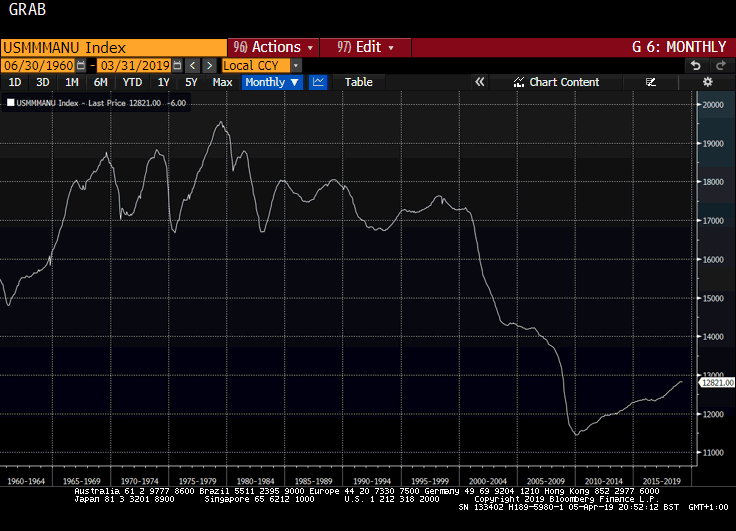My Diagnosis of Why Capitalism Is Now Not Working Well for the Majority of People
This report by Ray Dalio for Bridgewater is well worth taking the time to read. It highlights in the clearest terms the conditions that have led to the rise of populism and what that means for economic governance going forward. Here is a section:
Here is a link to the full report and here is a section from it:
Contrary to what populists of the left and populists of the right are saying, these unacceptable outcomes aren’t due to either a) evil rich people doing bad things to poor people or b) lazy poor people and bureaucratic inefficiencies, as much as they are due to how the capitalist system is now working.
I believe that all good things taken to an extreme become self-destructive and everything must evolve or die, and that these principles now apply to capitalism. While the pursuit of profit is usually an effective motivator and resource allocator for creating productivity and for providing those who are productive with buying power, it is now producing a self-reinforcing feedback loop that widens the income/wealth/opportunity gap to the point that capitalism and the American Dream are in jeopardy. That is because capitalism is now working in a way in which people and companies find it profitable to have policies and make technologies that lessen their people costs, which lessens a large percentage of the population’s share of society’s resources. Those companies and people who are richer have greater buying power, which motivates those who seek profit to shift their resources to produce what the haves want relative to what the have-nots want, which includes fundamentally required things like good care and education for the have-not children. We just saw this exemplified in the college admissions cheating scandal.
As a result of this dynamic, the system is producing self-reinforcing spirals up for the haves and down for the have-nots, which are leading to harmful excesses at the top and harmful deprivations at the bottom. More specifically, I believe that:
1) The pursuit of profit and greater efficiencies has led to the invention of new technologies that replace people, which has made companies run more efficiently, rewarded those who invented these technologies, and hurt those who were replaced by them. This force will accelerate over the next several years, and there is no plan to deal with it well.
2) The pursuit of greater profits and greater company efficiencies has also led companies to produce in other countries and to replace American workers with cost-effective foreign workers, which was good for these companies’ profits and efficiencies but bad for the American workers’ incomes. Of course, this globalization also allowed less expensive and perhaps better quality foreign goods to come into the US, which has been good for both the foreign sellers and the American buyers of them and bad for the American companies and workers who compete with them.
Because of these two forces, the share of revenue that has gone to profits has increased relative to the share that has gone to the worker. The charts below show the percentage of corporate revenue that has gone to profits and the percentage that has gone to employee compensation since 1929.
Capitalism trends towards consolidation as the strong overtake the weak. The list of Autonomies I created seven years ago is smaller now because even the largest companies with the biggest global franchises often merge to become even bigger and to capture even more market share. That’s as true of Dow Chemical as it is of Disney or Saudi Aramco.
Taken to its logical conclusion that would result in a single company controlling all of a given sector in much the same way Standard Oil did. Antitrust is therefore the antithesis of consolidation because it creates more competition. I remember seeing research, which I can’t lay my hands on right now, that the spun off companies from antitrust generally perform on aggregate better than the original company. That makes sense since competition should breed efficiency. Therefore, while jarring, it may not the worst outcome.
However, the broader question is whether the risk of additional taxes, regulations and growth inhibiting factors, not to mention outright forfeiture of private capital are more likely that antitrust in an era where the tide of populism is rising. That is the truly existential threat to capitalism.
I continue to think we are going to have to see a crisis to initiate the kinds of changes Dalio is suggesting for the simple reason no organization questions a successful strategy until it is forced to be circumstances, particularly when it has a responsibility to shareholders. That suggests inequality is going to be exacerbated before it is ameliorated.

The long-term trend of manufacturing jobs has two very clear lessons. The first is it collapsed after China was admitted to the WTO. The second is the “recovery” in manufacturing jobs has been paltry over the last decade relative to the previous decline. The clear conclusion is both domestic and overseas forces have contributed to inequality. When push comes to shove, populists have a long history of blaming the “Other”. That is the foundation for most wars.


